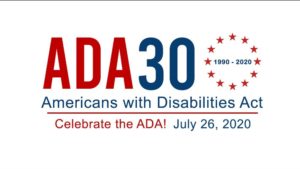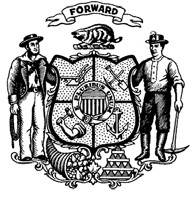Governor’s Committee for People with Disabilities
FOR IMMEDIATE RELEASE
CONTACT: David Morstad, Chair, (920) 248-9210, david.morstad@gmail.com
Website: gcpd.wisconsin.gov
PRESS RELEASE
Wednesday, July 23, 2020
 CELEBRATING THE 30th ANNIVERSARY OF THE AMERICANS WITH DISABILITIES ACT
CELEBRATING THE 30th ANNIVERSARY OF THE AMERICANS WITH DISABILITIES ACT
Governor’s Committee for People with Disabilities acknowledges there is still work to be done
MADISON, WI – The Governor’s Committee for People with Disabilities (GCPD) is recognizing the 30th anniversary of the signing of the American’s with Disabilities Act (ADA). Since people with disabilities represent the largest minority group in the nation, the signing of the ADA was a landmark moment that established a clear and comprehensive national mandate for the elimination of discrimination while upholding principles of equality and inclusion for people with disabilities.
The ADA prevents discrimination in the workplace and requires employers to provide reasonable accommodations to qualified applicants or employees and public places to be accessible, in order to prohibit discrimination against individuals with disabilities. In the years since its passing, the ADA has been expanded to include telephone and Internet accessibility.
“At the core, ADA means that just because you are born with a disability, you shouldn’t be unable to do basic things like get into a building, or use a bathroom in a restaurant. Without ADA, I wouldn’t be living my best life or independently,” said Pearl Fessenden, GCPD member-at-large.
Ben Barrett, Co-Chair of the Wisconsin Council on Physical Disabilities shared, “The ADA has allowed a small group of committed individuals to create heroic change. Always behind the scenes are invisible people doing the pushing. I would not have done what I did had I not met Shel Trap and Justin Dart Jr. They woke me up the need for individual advocacy and the fact that that was the only way my situation would change. It’s about others not me.”
Although the ADA has expanded opportunities for Americans with disabilities by reducing barriers, changing perceptions, and increasing full participation in the workplace, the community, and the legislative process there is still much work to be done.
People with disabilities are still often not able to work, as earning income, may cause them to lose vital medical or daily living supports, which are unaffordable without benefits assistance. Additionally, many people with disabilities are not able to get married as asset limits in benefit programs are counted and requires them to impoverish their spouse to continue to receive needed supports. Nationally and in Wisconsin there also still remains a lack of accessible housing and transportation for people with disabilities. In addition, the recent pandemic has highlighted that people with disabilities are still denied accommodations and are treated as second rate citizens in the health care system.
“Like all anniversaries related to civil rights, the 30th year of the ADA forces us to reflect on the past and what the future can be,” said David Morstad, chair of the GCPD. “We celebrate the opportunities realized because of this legislation, while committing ourselves to the unfinished work of ensuring equality for people with disabilities.”
In recognition of the 30th Anniversary of the signing of the ADA, GCPD is collecting written and video stories from people with disabilities in Wisconsin on the impact the ADA has had on their lives. In addition, GCPD is requesting people with disabilities identify issues or civil rights that still need to be addressed, which may be incorporated into the GCPD’s work plan for policy and legislative advocacy. To submit your story and help to identify barriers which still exist, please visit GCPD’s website at: https://gcpd.wisconsin.gov.
About the Governor’s Committee for People with Disabilities
In 1948, a Governor’s Committee was established with one goal: to improve employment opportunities for people with disabilities.
The group’s mission was broadened in 1976 to cover many aspects of disability in Wisconsin and became the Governor’s Committee for People with Disabilities (GCPD).
Unlike other disability councils in state government, the focus of the Governor’s Committee includes all disabilities and six of its members represent specific disability constituencies:
• Alcohol and other drug abuse,
• Blindness and visual impairment,
• Deaf and hard of hearing,
• Developmental disabilities,
• Mental health, and
• Physical disabilities.
The Governor’s Committee is charged with the following duties:
• Advise the Governor and state agencies on problems faced by people with disabilities.
• Review legislation affecting people with disabilities.
• Promote effective operation of publicly-administered or supported programs serving people with disabilities.
• Promote the collection, dissemination and incorporation of adequate information about people with disabilities for purposes of public planning at all levels of government.
• Promote public awareness of the needs and abilities of people with disabilities.
• Encourage the effective involvement of people with disabilities in government.
To learn more about GCPD, visit GCPD’s website: gcpd.wisconsin.gov.

